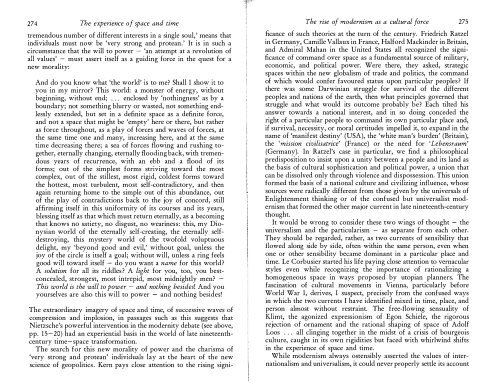The Condition of Postmodernity 13 - autonomous learning
The Condition of Postmodernity 13 - autonomous learning
The Condition of Postmodernity 13 - autonomous learning
Create successful ePaper yourself
Turn your PDF publications into a flip-book with our unique Google optimized e-Paper software.
274 <strong>The</strong> experience <strong>of</strong> space and timetremendous number <strong>of</strong> different interests in a single soul,' means thatindividuals must now be 'very strong and protean.' It is in such acircumstance that the will to power - 'an attempt at a revolution <strong>of</strong>all values' - must assert itself as a guiding force in the quest for anew morality:And do you know what 'the world' is to me? Shall I show it toyou in my mirror? This world: a monster <strong>of</strong> energy, withoutbeginning, without end; ... enclosed by 'nothingness' as by aboundary; not something blurry or wasted, not something endlesslyextended, but set in a definite space as a definite force,and not a space that might be 'empty' here or there, but ratheras force throughout, as a play <strong>of</strong> forces and waves <strong>of</strong> forces, atthe same time one and many, increasing here, and at the sametime decreasing there; a sea <strong>of</strong> forces flowing and rushing together,eternally changing, eternally flooding back, with tremendousyears <strong>of</strong> recurrence, with an ebb and a flood <strong>of</strong> itsforms; out <strong>of</strong> the simplest forms striving toward the mostcomplex, out <strong>of</strong> the stillest, most rigid, coldest forms towardthe hottest, most turbulent, most self-contradictory, and thenagain returning home to the simple out <strong>of</strong> this abundance, out<strong>of</strong> the play <strong>of</strong> contradictions back to the joy <strong>of</strong> concord, stillaffirming itself in this uniformity <strong>of</strong> its courses and its years,blessing itself as that which must return eternally, as a becomingthat knows no satiety, no disgust, no weariness: this, my Dionysianworld <strong>of</strong> the eternally self-creating, the eternally selfdestroying,this mystery world <strong>of</strong> the tw<strong>of</strong>old voluptuousdelight, my 'beyond good and evil,' without goal, unless thejoy <strong>of</strong> the circle is itself a goal; without will, unless a ring feelsgood will toward itself - do you want a name for this world?A solution for all its riddles? A light for you, too, you bestconcealed,strongest, most intrepid, most midnightly men? -This world is the will to power - and nothing besides! And youyourselves are also this will to power - and nothing besides!<strong>The</strong> extraordinary imagery <strong>of</strong> space and time, <strong>of</strong> successive waves <strong>of</strong>compression and implosion, in passages such as this suggests thatNietzsche's powerful intervention in the modernity debate (see above,pp. 15-20) had an experiential basis in the world <strong>of</strong> late nineteenthcenturytime- space transformation.<strong>The</strong> search for this new morality <strong>of</strong> power and the charisma <strong>of</strong>'very strong and protean' individuals lay at the heart <strong>of</strong> the newscience <strong>of</strong> geopolitics. Kern pays close attention to the rising signi-<strong>The</strong> rise <strong>of</strong> modernism as a cultural force 275ficance <strong>of</strong> such theories at the turn <strong>of</strong> the century. Friedrich Ratzelin Germany, Camille Vallaux in France, Halford Mackinder in Britain,and Admiral Mahan in the United States all recognized the significance<strong>of</strong> command over space as a fundamental source <strong>of</strong> military,economic, and political power. Were there, they asked, strategicspaces within the new globalism <strong>of</strong> trade and politics, the command<strong>of</strong> which would confer favoured status upon particular peoples? Ifthere -was some Darwinian struggle for survival <strong>of</strong> the differentpeoples and nations <strong>of</strong> the earth, then what principles governed thatstruggle and what would its outcome probably be? Each tilted hisanswer towards a national interest, and in so doing conceded theright <strong>of</strong> a particular people to command its own particular place and,if survival, necessity, or moral certitudes impelled it, to expand in thename <strong>of</strong> 'manifest destiny' (USA), the 'white man's burden' (Britain),the 'mission civilisatrice' (France) or the need for 'Lebensraum'(Germany). In Ratzel's case in particular, we find a philosophicalpredisposition to insist upon a unity between a people and its land asthe basis <strong>of</strong> cultural sophistication and political power, a union thatcan be dissolved only through violence and dispossession. This unionformed the basis <strong>of</strong> a national culture and civilizing influence, whosesources were radically different from those given by the universals <strong>of</strong>Enlightenment thinking or <strong>of</strong> the confused but universalist modernismthat formed the other major current in late nineteenth-centurythought.It would be wrong to consider these two wings <strong>of</strong> thought - theuniversalism and the particularism - as separate from each other.<strong>The</strong>y should be regarded, rather, as two currents <strong>of</strong> sensibility thatflowed along side by side, <strong>of</strong>ten within the same person, even whenone or other sensibility became dominant in a particular place andtime. Le Corbusier started his life paying close attention to vernacularstyles even while recognizing the importance <strong>of</strong> rationalizing ahomogeneous space in ways proposed by utopian planners. <strong>The</strong>fascination <strong>of</strong> cultural movements in Vienna, particularly beforeWorld War I, derives, I suspect, precisely from the confused waysin which the two currents I have identified mixed in time, place, andperson almost without restraint. <strong>The</strong> free-flowing sensuality <strong>of</strong>Klimt, the agonized expressionism <strong>of</strong> Egon Schiele, the rigorousrejection <strong>of</strong> ornament and the rational shaping <strong>of</strong> space <strong>of</strong> AdolfLoos ... all clinging together in the midst <strong>of</strong> a crisis <strong>of</strong> bourgeoisculture, caught in its own rigidities but faced with whirlwind shiftsin the experience <strong>of</strong> space and time.While modernism always ostensibly asserted the values <strong>of</strong> internationalismand universalism, it could never properly settle its account
















